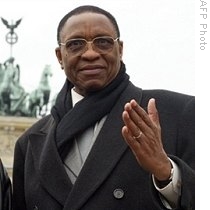Dakar
15 September 2009
Members of the Pan-African Parliament are in Niger for separate talks with President Mamdou Tandja and his political opponents concerning the referendum that has extended the president's time in office.
African parliamentarians are in Niger to assess the political crisis, following last month's referendum. They are to report back to the Economic Community of West African States, which is considering sanctions against the Tandja government.
 |
| President Mamdou Tandja (File) |
The president says the results show voters in Niger want him to stay in power, in part, to complete several large infrastructure projects including a Chinese oil refinery and a French uranium mine.
Election officials say more than two-thirds of eligible voters turned out for the referendum, and a resounding 92 percent voted to keep President Tandja in power.
The opposition Niger Party for Democracy and Socialism believes turn-out was closer to five percent. Civil society groups are calling for ECOWAS leaders to suspend Niger from the regional alliance because President Tandja went ahead with the referendum after dismissing both the parliament and the constitutional court that opposed him.
ECOWAS leaders threatened to sanction President Tandja if he changed the constitution, but have not yet acted against him as they are waiting to hear from the delegation of Pan-African Parliament members.
The European Union suspended aid to Niger over what it calls "grave violations" of the rule of law and democratic values. The French foreign ministry says the president's actions threaten to weaken Niger's institutions in a "lasting fashion."
Since the referendum, the Tandja government has accused nearly 30 opposition parliament members of financial crimes as part of an investigation into legislative expense claims.
The latest to be detained is opposition leader Mahamadou Issoufou, who was arrested shortly after security forces prevented him from leaving the country.
After being released on bail, Issoufou told reporters the financial charges against him are purely political. He says the people of Niger will see that next year's budget will be half of this year's budget because international donors are withholding aid to protest what he calls President Tandja's dictatorship.